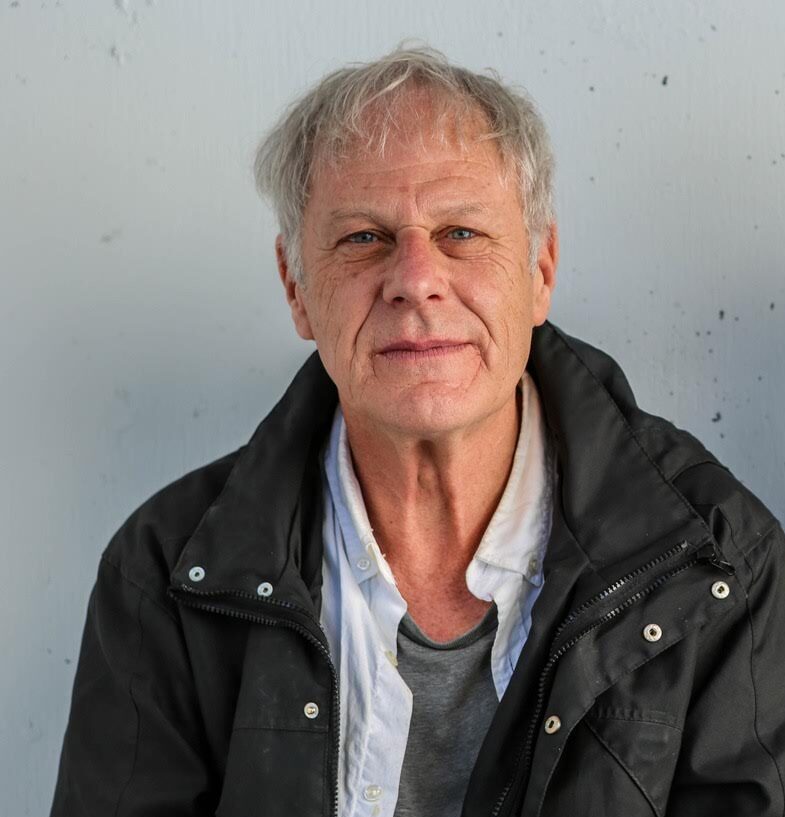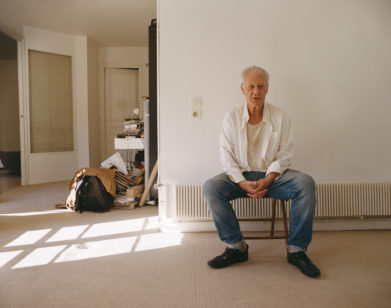ICON
Dennis Cooper Has a New Book Out. Just Don’t Expect Him to Do Any Readings.
I was nervous to introduce myself to Dennis Cooper when I spotted him in the audience of a Kevin Killian reading at After 8 Books in Paris in 2017, but I shouldn’t have been. He had been an early supporter of my literary magazine turned small press, Shabby Doll House, and, ridiculously, I felt at the time, seemed just as excited to meet me as I was to meet him. Dennis Cooper, the literary legend and filmmaker, editor of Little Caesar, author of The Sluts, the George Miles Cycle and many other books—the newest a collection of short fiction titled Flunker (Amphetamine Sulphate, 2024)—turned out to be just as supportive in person as he is on his incomparable, taste-making blog, through which he has celebrated the work of countless contemporary writers and artists for over two decades. That night, he asked me what I was doing in France and when I told him that I live here too, he said, “We should hang out!” And so that’s what we’ve done in the years since, sharing a penchant for writing and editing books and magazines that manifest communities around them. “It’s so easy and so natural to support people and give them strength,” he told me when we talked on Zoom this spring. And I know, first hand, he means it. When I found out Flunker, a collection of six stories, and his first book following the masterpiece I Wished (Soho Press, 2021) would be published by an indie press, I knew we had so much to talk about.
———
LUCY K. SHAW: The first thing I wanted to say was that I’m excited about your book. I just read it and loved it.
DENNIS COOPER: Thank you.
SHAW: Every time I’ve seen you over the last couple of years, we’ve been talking about your film. And then suddenly, I saw you last month and you go, “Oh yeah, I’m going to do a book this year.” And now the book’s coming out soon. So what happened? And when did you write this?
COOPER: Yeah, the film. Well, there was a lull. I don’t want to go into all the problems that caused the lull, but I always have to be working on something. And then I was like, “Oh, I have these things that I never finished. I should go see if I can finish them.” And some of them were just standalone things, some of them were pieces of novels that I didn’t end up using in the novel, and I just thought, “I wonder if I can make these autonomous.” They’re all, from the last 10, 12 years. I went through and I managed to get enough of them to make a teeny, tiny book. It’s got this transgressive thing going on in it, so I thought, “Oh, maybe this is something they (Amphetamine Sulphate) would be interested in.” And thankfully, they were.
SHAW: Why did you decide to have just six stories? That seems unusual, but I really like it.
COOPER: That’s as many as I could finish that were any good, and the rest weren’t good enough. There were some other ones, but I was just like, “I can’t get this thing to do anything.” And then I had to try putting them in all different orders and stuff. And then I was like, “Maybe this order’s okay.”
SHAW: How did you find that form?
COOPER: Oh, it was just about trying to create a contrast, trying to make it so that there’s a surprise every time you get to a new one, but at the same time there’s a flow. When I was writing The Marbled Swarm, I was really interested in emo, so I was looking into these emo social sites. They had these message boards and they would all explode at each other all the time like, “I’m going to kill myself. Should I kill myself? I don’t know.” Then they would talk back and forth, and I got really excited by how they wrote, because they wrote really fast and in that crazy way. It was like, “Oh, I want to see if I can do this in an authentic way.” Because those are all extremely honest. So then I made those, but I didn’t end up using them in the book. SO I just wanted to figure out things, “Where do I put the really extreme one?” I’m like, “I think I better wait a little while, so I think that one should be towards the end.”
SHAW: The book feels like it would be really great for someone who’s never read any of your work before. You see a bunch of your different styles and voices.
COOPER: There’s nothing in there that I haven’t done before, except for some of the formal stuff. It’s not like writing a novel, where you’re hoping to blow people’s minds. It’s just like, “Oh, here’s what I do. You want some more of what I do?” It’s like an EP, lots of B-sides gathered together. A couple of the stories were things that I didn’t use in I Wished [Cooper’s last novel].
SHAW: Oh, interesting. So my friend, Sebastian Castillo, whose book Salmon I published last year, he’s a very big fan of yours.
COOPER: Oh, me too. Tell him I’m the same.
SHAW: Yesterday I texted him, “I’m going to interview Dennis tomorrow. Do you have any questions for him?” And literally one minute later, he sent me a voice note. So I want to play you the voice note because he had this question prepared.
COOPER: Okay.
SEBASTIAN CASTILLO: I wrote a paper about Dennis Cooper’s poetry in grad school, and one of the things that I had to talk about was the fact that Dennis is most recognized as a novelist. In the 1994 Anthology of Contemporary American Poetry, his work was included, but it was removed in the 2013 anthology. Given that the novel functions as his primary genre, how does he feel about returning to the short story as a form? And has his relationship to the short form work changed throughout his career?
COOPER: Oh, wow. I’ve never written short stories. Honestly, they’ve always been fragments of things, experiments. I wrote things and I wanted them to be longer, or it was me trying something out. It was straight from poetry to novels, I didn’t really have any interim thing. I guess prose poems are like short stories. The poems were removed from the Norton Anthology because they really just weren’t that good. And also, I wasn’t the only one. David Trinidad and a bunch of other people who were actually very good poets were also removed. I think they just got a little bit more official or classical and it was like, “We need to put real poets in here, not these weirdos.” Thank you, Sebastian.
SHAW: Do you feel like you learned how to write fiction through writing poetry, that it taught you how to write?
COOPER: Yeah. I read a lot of fiction, but I only read avant-garde fiction or whatever, I never read normal fiction. And then movies and music, I’ve always been really like, “Oh, I want to make something that’s like this song. How can you do that with just words?” But I was concentrating a lot on poetry until the mid-’80s. It wasn’t like I just said, “All right, now I’m going to write fiction.” I started expanding them and turning them into paragraphs.
SHAW: Do you feel like you learned a lot from editing other people’s work, for books or for magazines?
COOPER: Oh, that’s interesting. I’m sure I did. I love editing. And I did Little Caesar while I was editing, and that was in the late ’70s to early ’80s. I wrote a lot of journalism for a while. I wrote for Spin and Interview Magazine, and you do a ton of editing because I don’t know how to write nonfiction and there’s a real formula to it. So you would work with the editor and they would say, “Well, if you want this to happen, here’s how you do it.” I didn’t know any of those tricks. That was a back and forth, editing, but it made a huge difference. My books got a lot better after I started writing journalism.
SHAW: I really love your book, Smothered in Hugs: Essays, Interviews, Feedback & Obituaries. What makes that book exciting to me is that the form of all those individual pieces are all weird versions of the thing that they’re supposed to be.
COOPER: Yeah. I did my best, but I can’t stop being weird, unfortunately.
SHAW: This is an annoying thing to ask given that you’ve just written this book and you’re working on a film, but do you have a sense of what kind of writing you would want to do after this?
COOPER: I’d like to write another novel, but I have to have a really good idea and I just don’t have one. I really want all my novels to be completely, hugely, gigantically challenging to me. But at the same time, I have my area that I work in, that I need to work in. And I’ve done 10 now, so it’s like, “Is there anything left?” I’ve done all these weird things like The Marbled Swarm, so I really need to think, “Oh, this is an amazing idea, no one’s ever done this before, and it really excites me.” The thing I’m mostly interested in right now is writing the script for the new film, because it really is extremely challenging.
SHAW: You are already working on a script for another one?
COOPER: Yeah.
SHAW: Have you always wanted to make films?
COOPER: I’ve always been obsessed with films and experimental films and stuff. When I went to college, I took filmmaking classes and I just had absolutely no gift for it at all. I always wanted to make a porn film. That was my big dream. “I’m going to make a porn film,” because I had this idea that porn was the great undiscovered medium and you could make a Citizen Kane of porn if you just did it right. I wanted to make a porn film for a long, long time, and then someone said, “If you can do it, I’ll give you the money to do it.” And then it turned out that what I wanted to do was not sexy at all. Cattle Towards Glow, our first film, came out of that thing. But I couldn’t make a film without Zac [Farley] at all. There’s absolutely no way I could. But Zac could make a film without me.
SHAW: You and Zac have a shared love of theme parks, which would maybe surprise some people. But also it makes total sense, right?
COOPER: Yeah.
SHAW: I love how much you take them seriously and study them, how they operate, that whole immersive experience.
COOPER: I think they’re a real art form. I grew up in Los Angeles, I went to Disneyland from the age of two several times a year my entire life. So I got completely corrupted by Disneyland because it was just the most amazing thing I’d ever seen when I was a kid. And I just wanted to figure out like, “Why is this so fucking great?” If you look closely, my books have a lot of references to Disneyland. We would totally make a film about amusement parks, except that it would cost millions and millions of dollars to rent an amusement park to film in.
SHAW: I actually had a similar experience. I didn’t grow up near Disneyland, but my parents took me there every year for several years when I was a kid. They really bought into it being the “happiest place on earth.” If I go now and watch the fireworks, I’ll still be overcome with emotion.
COOPER: I’m with you, babe.
SHAW: We should go one day.
COOPER: Absolutely. You just say the word. We should go to Asterix. Asterix is really nice.
SHAW: I’ve never been there.
COOPER: Yeah, we should go to Asterix. It’s really a nice little theme park. It’s an hour from Paris. But where we should really go is Efteling, that’s the best music park in the world. It’s in Holland. It’s the one that Disneyland was inspired by. Oh, it’s such a fucking amazing place.
SHAW: Let’s do it. What can I talk about now?
COOPER: We need to be careful.
SHAW: We’ve gone off-topic. I guess another thing that we have in common, aside from Disneyland, is that we both put ourselves in this position where we curate projects of art and literature that build community around them. Why did you do that? Why did we do that?
COOPER: I was always driven to do that. When I was a little kid, I built a playhouse in our attic and I had the kids in the neighborhood be the acting troupe and we’d act out theater pieces for our parents or whoever. And every summer, I would get my friends to help me build an amusement park in my backyard. I just always did shit like that. I really like curating, I really like editing. You’re probably the same way. It’s really gratifying to help people, and it’s so fucking easy. It’s a lot of grunt work, but it’s so easy and so natural to support people and give them strength. If someone comes to me and they like my work and they’re artists of some kind, if you just take them seriously and treat them as peers and show support for their work, it means a ton. When I was just starting to write, when someone I respected gave me any kind of feedback or talked to me about what I was doing, it was just massively confidence-building.
SHAW: Was there anyone in particular who did that for you?
COOPER: Yeah. When I was writing poetry, people liked it. Allen Ginsberg was really nice to me, but he wanted to fuck me. And when he realized he couldn’t fuck me, he stopped being nice to me. But at the time, it seemed really nice. When I was doing Little Caesar, I would write to other poets, too. It was just like, “Ooh, I want to get a poem by Joe Brainard or Ted Berrigan.” So I’d write them note and say, “Hey, I do this magazine, let’s make a poem.” And then luckily, a lot of them would say, “Oh, I love that magazine.” But those are weird people, right? But outside of that world, people would just go, “Ah, these are just kids doing this silly thing. This is just some little weird project. This isn’t going to get me a blurb for my novel.” I don’t know, I don’t understand it.
SHAW: When I meet people who are 10 or 15 years younger than me, I’m like, “Oh. I want to help them and be involved.” We love doing this. We can’t stop doing it. There’s other stuff you could do that would be more meaningful in the world, but our thing is we want to make magazines and books really badly.
COOPER: I’m not picky about who I support. If they seem smart and they really want to be a writer or a painter or a filmmaker, that’s all I care about. I think people think of it as a gamble. Like, “Well, is this person going to actually become a major figure in the arts?” It’s like, no one would ever have thought I would’ve become anything when I was first writing. If someone really, really wants to be an artist, then that’s it. Do it, do it, do it, do it, because you never know what’s going to happen. I think a lot of people have that attitude like, “I need to believe there’s a payoff here somehow.” I never think about that. If you end up becoming a great writer, cool. If you decide to quit writing, cool. I’m still going to like you and think you’re interesting, because you are.
SHAW: I didn’t plan to ask this, but now it just seems like something worth bringing up. Living in France, as we both do, does that affect your inclusion in the literary scene?
COOPER: Everything’s online now, so it doesn’t really feel that different. It’s nice to have all these writers that you like or correspond with and you don’t really know them. I like that, other than the extraordinary postage costs to get some books over to here. I’m thinking about going to AWP. There’s a couple of people who want me to be on their panels and I’ve never been. That would be a good opportunity to actually meet a lot of these people.
SHAW: Where is it?
COOPER: Los Angeles. Do you go to that? Do you go to AWP?
SHAW: I’ve never been to the actual thing. I like being separate and in France, and then being like, “Okay, now I’m going to America for a couple of months and I’m doing a tour and I’m going to see everyone and then I can leave again.”
COOPER: Yeah, absolutely.
SHAW: Are you going to do events for your book?
COOPER: No, I don’t think so.
SHAW: Not even one.
COOPER: I mean, it’s just a little book, and I’m here. I mean, if I go to L.A., maybe I’ll see if I can do a little reading.
SHAW: You should.
COOPER: I’m just so curious to see what happens with it. Like I said, it feels like an EP or something.
SHAW: People seem excited online.
COOPER: I hope they’re not getting too excited, but that’s good.




